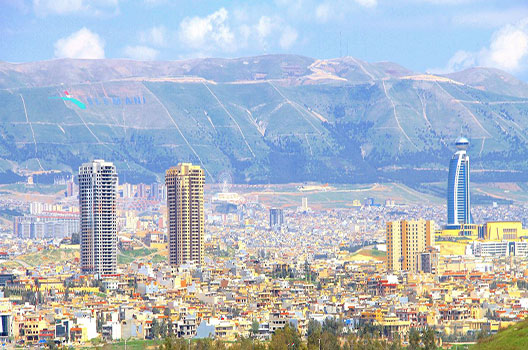 Dreams of economic prosperity and stability came crashing down in Kurdistan when the Iraqi central government ceased supporting the region’s budget, oil and gas prices hit rock bottom, and the war against the Islamic State in Iraq and al-Sham (ISIS) flared up in other parts of the country—causing over 1.8 million refugees and internally displaced persons (IDPs) to flee to Kurdistan. As a result, Kurdistan’s economy—thus far almost entirely dependent on the energy sector and support from Baghdad—collapsed and has been almost nonexistent for the past two years. The people of Kurdistan should not depend on Baghdad to rebuild build their economy; Kurds must take initiative by pursuing their own enterprises.
Dreams of economic prosperity and stability came crashing down in Kurdistan when the Iraqi central government ceased supporting the region’s budget, oil and gas prices hit rock bottom, and the war against the Islamic State in Iraq and al-Sham (ISIS) flared up in other parts of the country—causing over 1.8 million refugees and internally displaced persons (IDPs) to flee to Kurdistan. As a result, Kurdistan’s economy—thus far almost entirely dependent on the energy sector and support from Baghdad—collapsed and has been almost nonexistent for the past two years. The people of Kurdistan should not depend on Baghdad to rebuild build their economy; Kurds must take initiative by pursuing their own enterprises.
Kurdistan has an estimated population of around five to six million of which only two million people are of the working age, and 1.4 million of those work in the public sector—seventy percent of the working population is employed by the government. Since Kurdistan’s economic crisis erupted in 2014, the government has had difficulty paying its employees, who now often go months without receiving a salary. To lighten the budgetary burden, the Kurdistan Regional Government (KRG) cut salaries across the board—some by as much as seventy-five percent.
While the KRG has had to host 1.8 million refugees and IDPs, hundreds of Iraqi Kurds have migrated to Europe in hope of finding safety and job security. In a report published by the International Organization for Migration, Migration Flows from Iraq to Europe, an estimated eighty percent of survey respondents left Iraq—including the Kurdistan Region of Iraq (KRI)—due to unemployment. However, many Kurds have realized that resettling in Europe has not provided them with the life they had envisioned. As a result, some have returned to Kurdistan. Young people do not necessarily see a future for the region, and are thus trying to find success elsewhere. Furthermore, the lack of economic opportunity and the salary cuts or postponement of payments has led to protests in the KRI.
For years, the public sector hosted the most attractive employment opportunities for Kurds. It provided job and income security that were not guaranteed or offered in the private sector. With the ongoing economic crisis, this has changed. The population in the region has not taken real steps to adjust its lifestyles; people often continue their jobs while waiting to get paid, or are unemployed due to hiring freezes imposed by the KRG.
The rentier economies of many Gulf countries should not be the answer for the Kurds. The past two years have proven that the KRG cannot sustain itself by oil sales and financial support from the central government alone. Besides dependency on the energy sector, a report launched by the KRG in cooperation with the World Bank, which lays out a roadmap for economic reforms, highlights the “excessive role of the public sector in the economy,” “dependency on imports,” and a “weak financial system and dependency on cash-economy” as other major factors responsible for the economic collapse. The reforms, if implemented fully, should lead toward a more diversified, stable, and prosperous economy in the long term.
While the KRG implements these measures and adopts legislation that will make the private sector more enticing, the people of Kurdistan can take their own steps in developing a secure economy. It is time for the Kurdish population to become creative and entrepreneurial by starting small- and medium-sized enterprises (SMEs). Agriculture and information technology industries are ideal sectors for investment.
There are organizations active in Kurdistan that have assisted SMEs in the past. For instance, the United Nations Development Programme funded local Kurdish organizations, such as the Women Empowerment Organization, to support professionals owning or starting SMEs with trainings and workshops to provide entrepreneurs with the necessary skills to start and succeed in their business. Outside of business training, My Entrepreneurial Dream is a newly established organization that is opening business incubators and hubs in the region, which would help entrepreneurs realize their dreams.
The KRG must implement economic reforms that will increase economic diversity. But the population needs to starts taking action on, and responsibility for, its own prosperity. In tandem, these measures will create a stable and secure economy in Kurdistan.
Bina Hussein is an assistant director with the Atlantic Council’s Eurasian Energy Futures Initiative.
Image: The city of Sulaymaniyah in Kurdistan in Iraq in Spring 2016. (Wikipedia/Diyar Mohammed)
